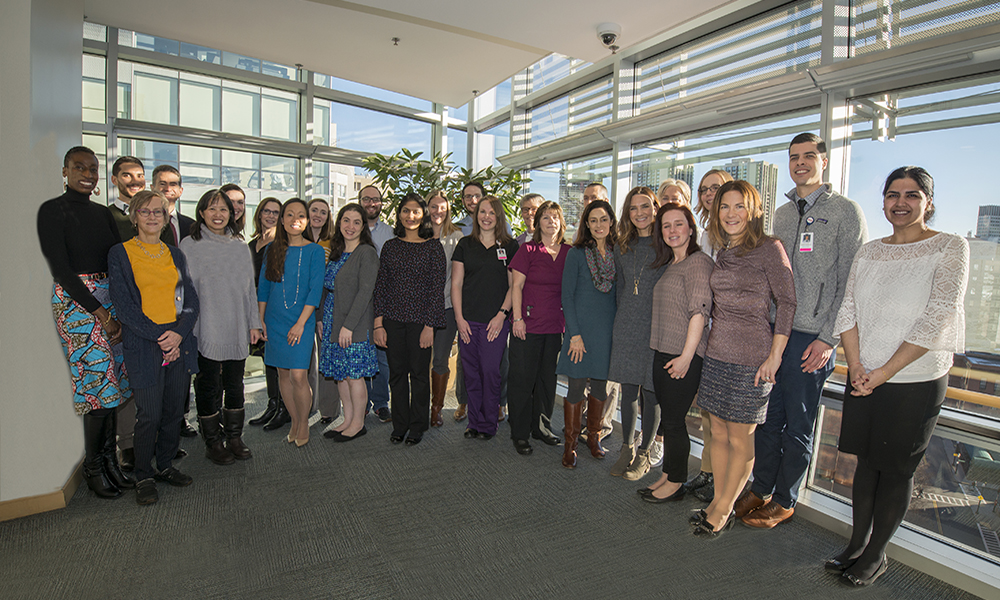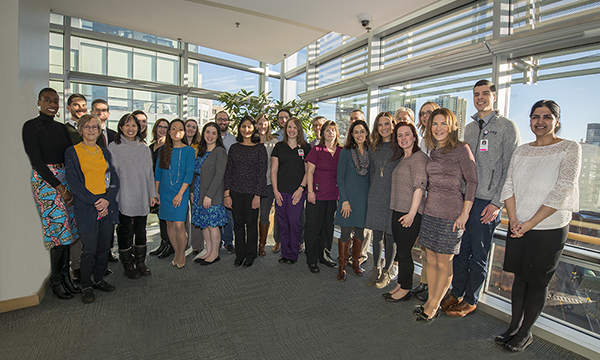New Breast Cancer Screening Guidelines Advise Mammograms at Age 40
The U.S. Preventive Services Task Force now recommends women start getting mammograms at age 40, as breast cancer rates are increasing in younger women.
Weather AlertMass General Brigham's hospital campuses and off-site facilities are fully open and operational on Tuesday, Feb. 24, with the exception of some limited closures. For real-time updates and service changes, please check our Alerts page.View Alerts page
Mass General Brigham Cancer Institute
Contact Information
Our approach is to be as minimally invasive as possible, both in diagnosing and in treating breast cancer, and to save as much breast tissue as we safely can. Among the innovative approaches offered are:
Our team of breast cancer center experts will develop and coordinate a treatment plan personalized for you. They will meet often to review your progress and will communicate findings with you and your referring doctor. This clear communication leads to seamless coordination of your care.
Video: Dr. Bev Moy explains what patients can expect during a multidisciplinary appointment.
A precise, accurate diagnosis is critical to appropriate treatment. Our radiologists and pathologists are skilled in detecting and evaluating breast cancers. They use sophisticated imaging and surgical procedures to determine the location, stage and type of breast cancer. For more information on breast cancer diagnosis, please see our Avon Foundation Comprehensive Breast Evaluation Center.
Your treatment plan will depend on factors such as the type and stage of breast cancer, your general health, and your preferences. Breast cancer treatment may involve one or more of the approaches outlined below.
Surgical options include:
Nonsurgical options include:
In addition to traditional chemotherapies, patients have access to new approaches that studies are showing to be effective including:
Less invasive surgery leads to faster recovery. Patients do better when they are cared for by specialists in their type of cancer and in centers that treat higher numbers of patients with the same type of cancer. Our surgeons are breast cancer specialists, treating approximately 1,000 newly diagnosed patients per year. Learn about our Breast Cancer Surgery Program.
The goal of radiation therapy is to shrink or destroy tumors using high-energy radiation beams while sparing healthy tissue. Learn about our Radiation Therapies.
Lymphedema (swelling) can be a side effect of breast cancer. Find out more about our unique Lymphedema Screening Program.
Clinical trials are research studies of new drugs, new combinations of drugs or already approved drugs being studied to treat patients in new/different ways. They may include new drug doses or new ways (schedules) to give the drugs. Clinical trials are run under strict guidelines. Their purpose is to help find out whether new cancer treatments are safe and effective or better than the standard (current) treatment. At Mass General Brigham Cancer Institute, there are several clinical trials open for the treatment of breast cancer that use the latest in cancer treatments.
Cancer is increasingly becoming a disease in which the genetic make-up of each individual cancer drives therapy. The Center for Breast Cancer also has access to clinical trials involving these targeted therapy approaches.
Find listings of our current Breast Cancer Clinical Trials.
Every patient treated at the Center for Breast Cancer has a multidisciplinary team of specialists that coordinates every aspect of his or her care. The Breast Cancer team is headed by Leif Ellisen, MD, PhD, Program Director, and Beverly Moy, MD, MPH, Clinical Director, and includes medical, radiation and surgical oncologists, pathologists, members of the department of imaging, researchers in cancer genetics, nutritionists, and physical therapists.
Katie Britton
Spin instructor and mom, Katie Britton, was surprised by her breast cancer diagnosis. Taking advantage of the PAVING program and other supportive care services at the Mass General Brigham Cancer Institute helped Katie navigate her treatment and find support.
Melissa Dupuis
When new mother Melissa Dupuis was diagnosed with breast cancer, she turned to Mass General Brigham Cancer Institute where she received the latest treatments, including proton therapy, to help treat her breast cancer.
Dianne Austin
After losing her hair to the side effects of chemotherapy for breast cancer, Dianne decided to start a company that will design and provide wigs to women of color seeking wigs that look like their natural hair.
Anne Bunn
Learn about Anne's journey from breast cancer diagnosis through treatment, and find out what her life is like now.
Breast cancer is a disease in which malignant (cancerous) cells grow and multiply in the breast tissues. According to the American Cancer Society, it is the second-most common form of cancer in American women.
View breast cancer treatment materials & factsheets.
This program helps patients keep their hair or reduce how much hair they lose from chemo.
We help to identify families that may have a hereditary breast or ovarian cancer syndrome.
Our program provides care to patients with all stages of TNBC.
Our Breast Evaluation Center focuses on breast health and breast cancer detection.
Mass General's Breast Imaging Program provides state-of-the-art exams.
Learn about Mass General's breast cancer surgery program.
This program enhances body, mind & spirit both after and during breast cancer treatment.
This program helps patients regain physical abilities and maintain independence.
We offer a variety of education and support resources to help you and your family.
Learn about breast cancer and meet Amy Comander, MD, medical director of the Mass General Brigham Cancer Institute in Waltham and director of the Breast Oncology Program at Newton-Wellesley Hospital, who describes available breast cancer treatment options.
The Cancer Institute’s Dr. Bev Moy explains what patients can expect during a breast multidisciplinary appointment.
The Cancer Institute’s Dr. Bev Moy urges women to speak with their primary care physician about when they should be screened for breast cancer.
Mass General Brigham Cancer Institute’s Dr. Bev Moy talks about the Cancer Institute’s goal to provide the best possible care for all patients – either at the main campus in Boston or out in the community.
New technologies in genetic testing have recently uncovered information about other genes linked to hereditary breast cancer. Join Carly Grant, MS, LCGC to learn about other hereditary breast cancer genes beyond BRCA1 and BRCA2.
This video is a short, gentle yoga practice that has been created by Cancer Institute breast cancer care providers and instructed by Luba Zagachin, Mass General Brigham Cancer Institute yoga instructor.
Mass General Brigham Cancer Institute has the only proton therapy site in all of New England, with two proton therapy centers.
Our support programs can help patients and their families cope with the challenges of a cancer diagnosis.
This program is designed to enhance your body, mind and spirit both after and during breast cancer treatment.
The U.S. Preventive Services Task Force now recommends women start getting mammograms at age 40, as breast cancer rates are increasing in younger women.
The findings could lead to new ways to overcome treatment resistance in patients with advanced forms of breast cancer.
Findings could be used to develop strategies to block this capability and prevent cancer spread.
In a clinical trial of 406 patients, Mass General Cancer Center investigators found that real-time imaging using a fluorescent agent had a favorable impact for 1 in 10 patients, with potential to avoid a second surgery.
When new mother Melissa Dupuis was diagnosed with breast cancer, she turned to Mass General Brigham Cancer Institute where she received the latest treatments, including proton therapy, to help treat her breast cancer.
In 2020, Carr took up running to keep herself both physically and mentally active during the COVID-19 pandemic. She completed her first double digit run—10 miles—on Dec. 31. Six days later, after a routine checkup with her doctor, she was diagnosed with breast cancer.
Contact us to make an appointment or to learn more about our programs.

